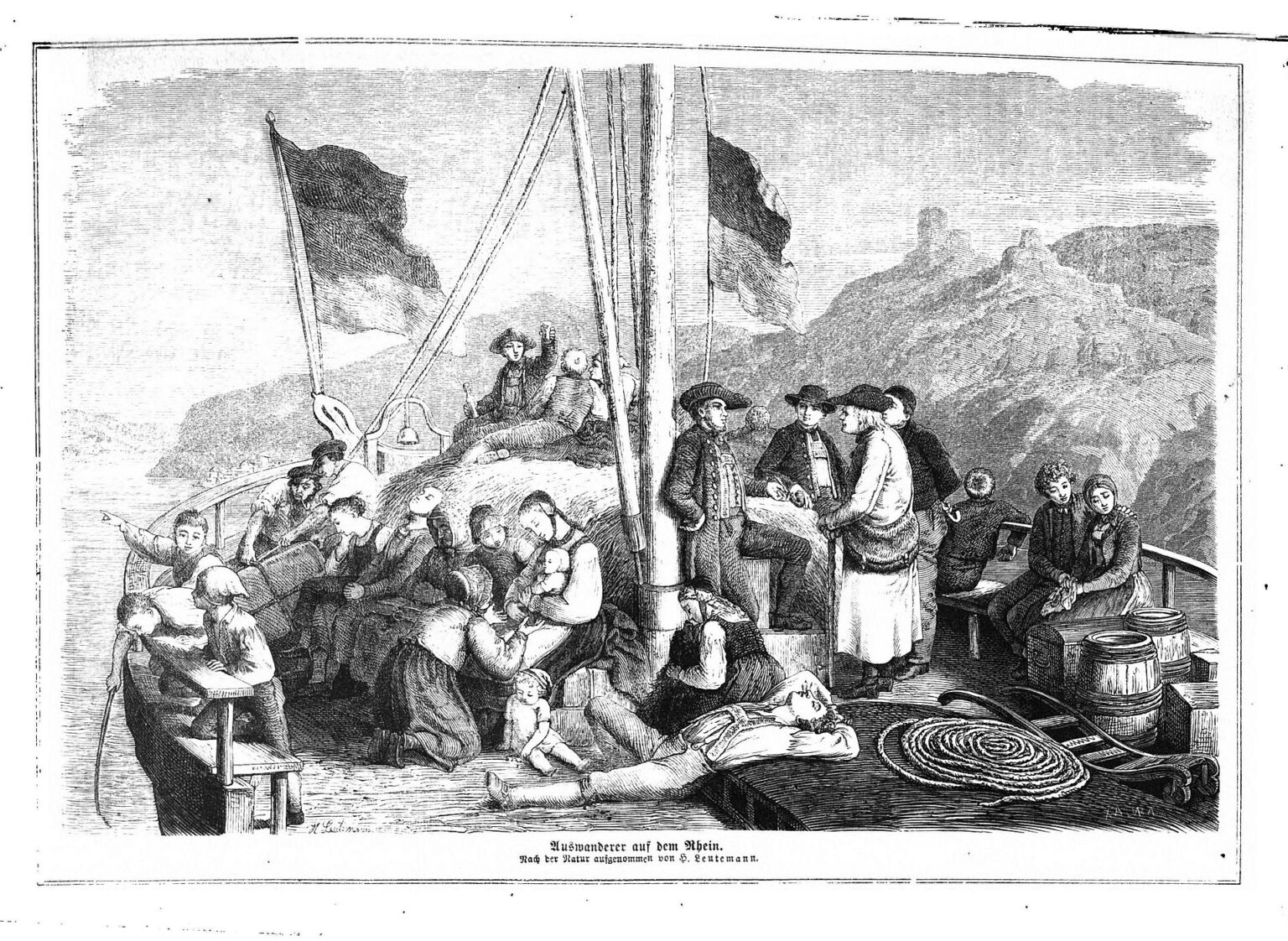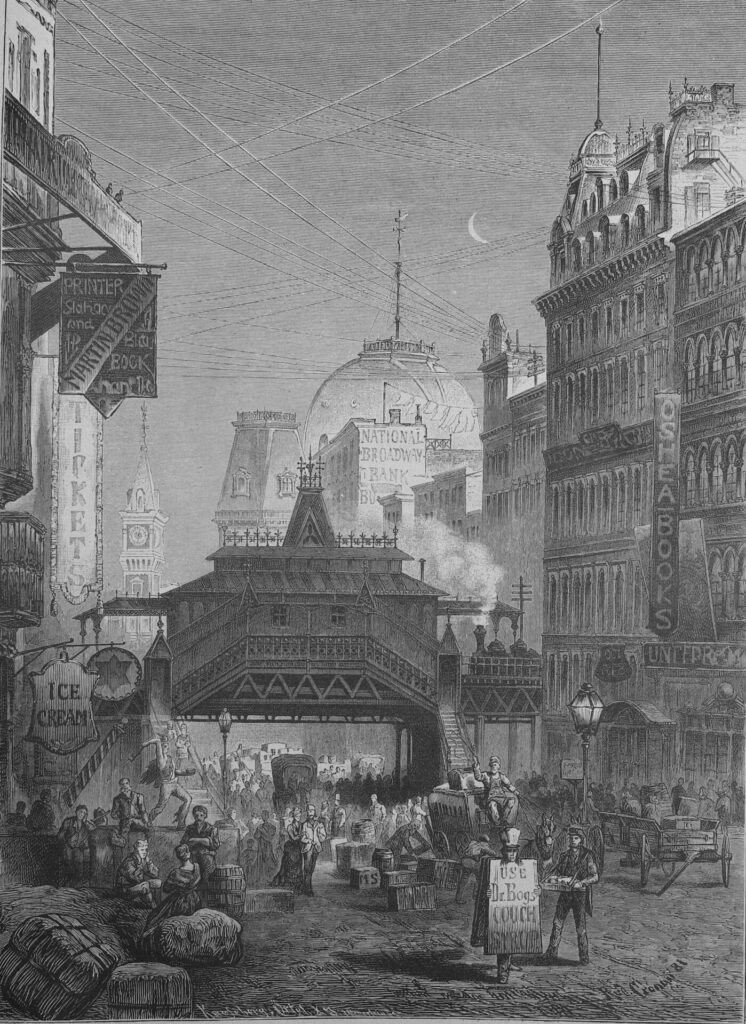What Did They Know?
A Miniseries on Prospective Baden Migrants and Their Knowledge of America in the 1870s and 1880s
With contributions by Martin Bemmann, Marie Nella Hoffmann, Hannah Laubrock, and Luca Leitz-SchwoererIt is certainly true that in the nineteenth century many Germans who emigrated to North America did not really know what they could expect there and how their life had to change in order to succeed in their new homelands. However, it is surely also true that every one of them actually had a certain knowledge about “America” or the “United States” in a broad and diffuse sense before they headed off on their journey. This knowledge was based on digesting masses of information on the overseas country from a multitude of sources: books and newspapers, journals and magazines, travel guides and novels, letters and talks, but also, of course, hearsay. All of these information sources shaped what contemporaries knew about “America,” how they planned their journey, and how they began to acculturate and to integrate into the new social, political, economic, cultural, and environmental contexts.

Inspired by Simone Lässig and Swen Steinberg’s recent claim that “we know little about the knowledge available to prospective migrants before they departed their homelands,”1 we, students and a lecturer of the University of Freiburg, took this quite general consideration as a starting point for exploring during a university course what average Germans—i.e., prospective emigrants—could know about “America” in the south of the Grand Duchy of Baden in the nineteenth century. If conducted systematically and broadly, such an investigation would provide an important basis for understanding the relevance of knowledge for migration processes and, vice versa, for apprehending the influence of migration on the shape and the “content” of knowledge. What kind of information shaped the knowledge relevant for an individual’s migration? How did knowledge on specific aspects acquired by emigrants before their journey influence the actual migration, arrival, and acculturation processes? To what extent and in which circumstances did such knowledge change during and after the migration process? To what extent did this changed knowledge of migrants impact what their compatriots at home knew about “America”? And what happened when different forms of knowledge and differing “knowledge systems”—on individual and societal levels—collided with each other before, during, and after the migration process?2
Within the framework of a single university course, it is impossible to establish an adequate empirical basis for answering such broad questions. Also, many of the empirical findings we unearthed during our research in southern Baden may sound familiar to specialists of the issues covered by the individual blog entries. Nevertheless, we consider the results of our investigation interesting and important enough on the whole to share them with a broader audience than seminar texts usually receive. This is mainly due to the methodological approach we chose. It allowed us to explore the topic in both a broader and a more detailed way than earlier authors had. Originally drafted as an annotated collection of sources, we revised our contributions considerably, transforming them into the individual blog entries that constitute this miniseries.
In our project, we asked what Badeners from the Freiburg region could learn in the 1870s and 1880s about “America” from a variety of information sources: letters of emigrated family members, newspapers and journals, fiction and guidebooks, as well as textbooks for elementary schools and local libraries. The various contributions will examine these in turn. Most of these sources belonged to publication genres that millions of Germans used on a daily basis at that time. They were neither addressed especially toward potential emigrants nor written for a relatively small group of the social elite or academic specialists. Consequently, we interpret them as a kind of keyhole that allows us to glimpse at the information average Germans could gather, digest, and then transform into their individual knowledge on “America.” At the same time, our focus on a specific period and a specific German region ensured that all the printed sources we analyzed were theoretically accessible for almost all the contemporaries living there. Obviously, in the case of personal letters, this is not true. However, we can assume from the research literature that their contents are very similar to what such correspondence usually comprised.3 Also, it is clear that the sources we analyzed do not encompass the whole spectrum of the material shaping contemporaries’ knowledge about “America.” In particular, low-priced publications circulating in thousands of copies, printed pictures, and widely known folk songs are important genres we were not able to cover.4 We hope, however, that the blog entries reveal the usefulness and feasibility of our approach for exploring what actually shaped the usual German emigrant’s knowledge about “America.”

We chose southern Baden—actually, the region around Freiburg—as an exemplary case because it was a major place of origin of German emigrants to North America during the nineteenth century. Since we all live in the town or its vicinity, we also had the advantage of being able to conduct in-depth research in local archives and libraries. There were two reasons for our choice to focus on the 1870s and 1880s. For one thing, the literacy of the German population was well advanced at that time. Already in 1871, about 87 percent of all Germans were able to read, but twenty years later, this had risen to almost 100 percent.5 Thus, one can assume that all of the material we analyzed could have been read by people of all social classes. For another thing, the years around 1880 witnessed the third and last wave of emigration from Baden to the United States (after the first wave in 1816–1817 and the second one after the 1848 revolution). Compared to the two former waves, this third one was driven less by social grievances or political upheavals than by emigrants’ heightened thirst for adventure and desire to improve their own economic situation. The optimistic spirit of the “Gilded Age” in the United States, especially, as well as the economic upswing underlying this mood, drew members of Baden’s middle classes like a magnet.6 Consequently, knowledge about the prospective travel destination was probably more important in people’s decision to emigrate than it had been in earlier decades.

Martin Bemmann is a historian and a lecturer (Privatdozent) at the University of Freiburg. Interested in the history of knowledge as well as in economic and environmental history from a global perspective, he currently explores multilateral research collaboration within the Council for Mutual Economic Assistance in the 1970s and 1980s, an international organization of socialist states.
Featured image for the miniseries: Excerpt of the title page from Friedrich Gerstäcker, Nach Amerika! Ein Volksbuch, Vol. 6 (Leipzig, 1855), 5, digitized by the Bayerische Staatsbibliothek.
- Simone Lässig and Swen Steinberg, “Knowledge on the Move: New Approaches toward a History of Migrant Knowledge,” Geschichte und Gesellschaft 43 (2017): 313–46, 331. ↩︎
- On the concept of the intertwined historiographies of knowledge and migration on which this miniseries is based, see Lässig and Steinberg, “Knowledge”; more generally on the history of knowledge as we pursued it, see Jakob Vogel, “Von der Wissenschafts- zur Wissensgeschichte: Für eine Historisierung der Wissensgesellschaft,” Geschichte und Gesellschaft 30 (2004): 639–60; Peter Burke, What Is the History of Knowledge? (Cambridge, Malden: Polity, 2016); Simone Lässig, “The History of Knowledge and the Expansion of the Historical Research Agenda,” Bulletin of the German Historical Institute Washington 59 (2016): 29–58; James Beattie and Ruth A. Morgen, “From History of Science to History of Knowledge? Themes and Perspectives in Colonial Australasia,” History Compass 19, no. 5 (2021): 1–10 ↩︎
- Ursula Lehmkuhl, “Das Genre der Auswandererbriefe,” in Handbuch Brief, Vol. 1, ed. Marie Isabel Matthews-Schlinzig et al., 631–45 (Berlin, Boston: De Gruyter, 2020); Wolfgang Helbich, ed., “Amerika ist ein freies Land …” Auswanderer schreiben nach Deutschland (Darmstadt, etc.: Luchterhand, 1985); www.auswandererbriefe.de ↩︎
- Heinz J. Galle, Volksbücher und Heftromane, Vol. 3, 3rd ed. (Lüneburg: Dieter von Reeken, 2020); Lutz Röhrich, “Die Lieder der deutschen Auswanderung nach Amerika während des 19. Jahrhunderts,” Lares 51 (1985): 547–92. ↩︎
- Hans-Ulrich Wehler, Deutsche Gesellschaftsgeschichte, Vol. 3 (Munich: C.H. Beck, 1995), 1193. ↩︎
- Alexandra Fies, Die badische Auswanderung im 19. Jahrhundert nach Nordamerika unter besonderer Berücksichtigung des Amtsbezirks Karlsruhe zwischen 1880–1914 (Karlsruhe: KIT Scientific Publishing, 2010); Karl-Heinz Meier-Braun and Reinhold Weber, Kleine Geschichte der Ein- und Auswanderung in Baden-Württemberg (Leinfelden-Echterdingen: DRW-Verlag, 2009). ↩︎








